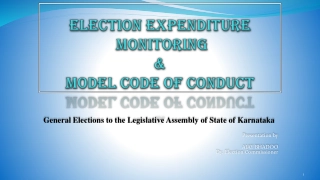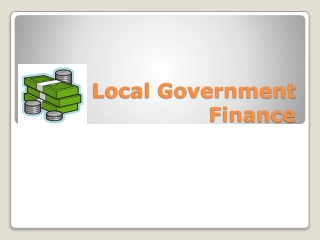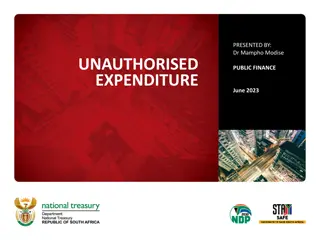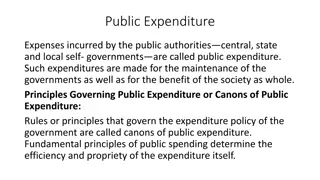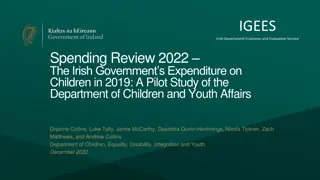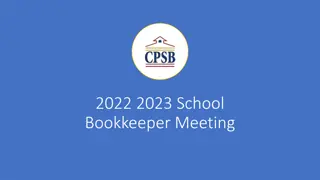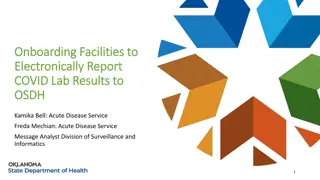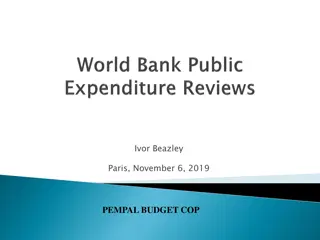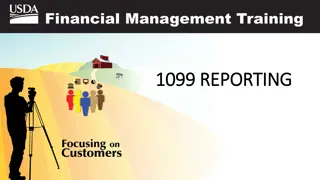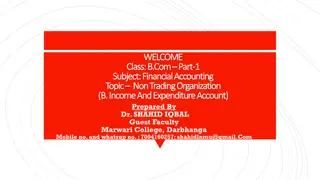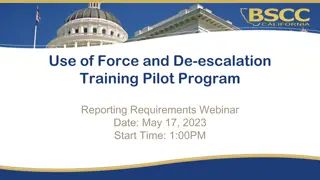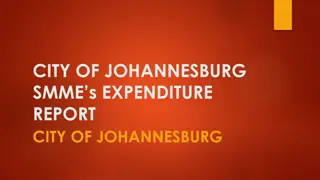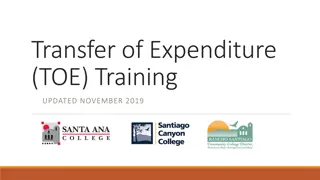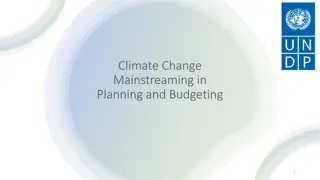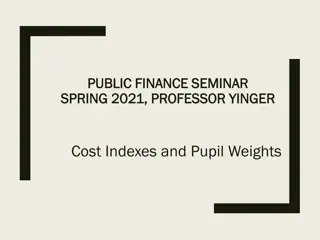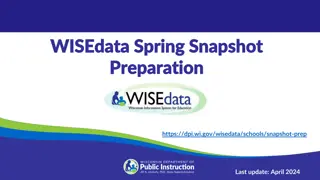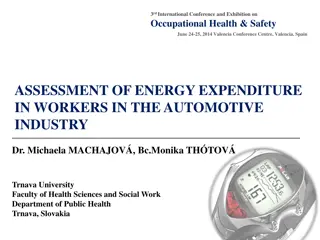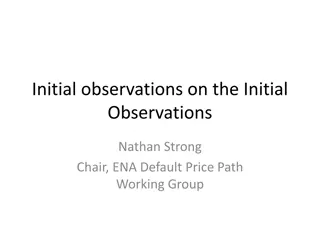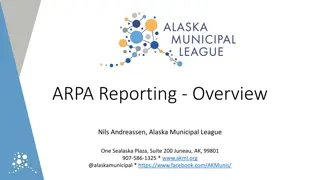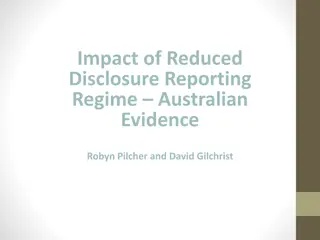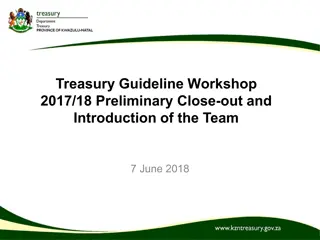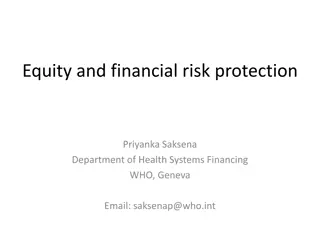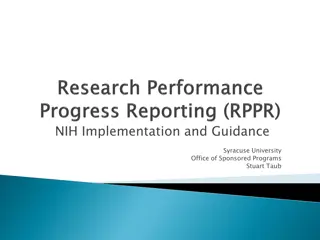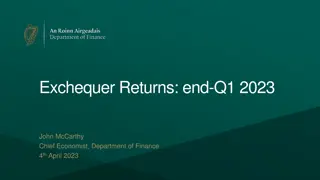Insights on Election Expenditure Monitoring in Indian State Assemblies
This presentation by Ajay Bhadoo, Deputy Election Commissioner, delves into the significance and regulations surrounding election expenditure monitoring in states like Mizoram, Telangana, Chhattisgarh, Rajasthan, and Madhya Pradesh. It covers the impact of money power, legal provisions, types of ele
0 views • 56 slides
Election Expenditure Monitoring in Karnataka State Legislative Assembly Elections
Presentation on the impact of money power in elections, the objective of election expenditure monitoring, legal provisions, machinery involved, role of expenditure observers, and focus areas for monitoring. Details on cases of rescinding elections due to detected money use, types of election expendi
0 views • 59 slides
Local Government Finance
Local government finance in Scotland is undergoing changes with a focus on austerity. The key areas to comprehend include revenue and capital expenditure, budgeting, service planning, financial reporting, and public accountability. Revenue expenditure encompasses annual service costs, while income i
2 views • 41 slides
Briefing to the Standing Committee on Appropriations on Adjustments Appropriation Bill
The presentation by Ms. Funani Matlatsi, DDG: CFO District Development Model, covers the adjustments in the national expenditure outcome, rationale for unallocated funds, impact on LGES, financial performance of the Municipal Infrastructure Grant, measures to mitigate fund stopping, steps to settle
3 views • 37 slides
Contrasting Public Finance and Private Finance
Public finance involves the income and expenditure of governmental bodies, focusing on societal welfare, compulsory nature, coercive revenue collection, and long-term welfare objectives. In contrast, private finance pertains to individual financial operations, voluntary nature, income adjustments to
9 views • 42 slides
ECC Social Value Reporting and Evaluation Framework
Essex County Council (ECC) has implemented a robust Social Value Reporting and Evaluation framework based on the Local Government Association's National TOMs method. This framework categorizes and assesses social value contributions in two parts - Value Score and Supporting Statement Score - to deri
3 views • 16 slides
Types of Business Expenditure and Capital Expenditure Explained
Learn about the different types of expenditure in business, including capital expenditure on non-current assets like tangible and intangible items, and revenue expenditure for day-to-day trading activities. Explore examples such as machinery, goodwill, patents, trademarks, and more. Understand the d
3 views • 11 slides
Understanding Income and Expenditure Account in Accounting
Income and Expenditure Account, similar to the Profit and Loss Account, records revenue items on the credit side and expenses on the debit side. It follows the accrual concept and reflects only the current period's incomes and expenses. Surplus or deficit is shown based on the excess of income over
0 views • 4 slides
Understanding Unauthorised Expenditure in Public Finance Management
The presentation by Dr. Mampho Modise delves into the concept of unauthorised expenditure in public finance management as defined by the Public Finance Management Act of 1999. It explains the implications of overspending on votes or main divisions and provides insights into how unauthorised expendit
1 views • 24 slides
Principles Governing Public Expenditure: Canons of Public Spending
Public expenditure refers to expenses incurred by government authorities for maintaining governance and societal well-being. The canons of public expenditure guide governmental spending by emphasizing social benefits, efficiency, proper sanctioning, and fiscal prudence to avoid deficits.
3 views • 26 slides
Irish Government Children Expenditure Study 2019
The Irish Government's Department of Children and Youth Affairs conducted a pilot study in 2019 to analyze the expenditure on children. The report aims to develop a methodology for transparent assessment of spending on children to ensure it meets their current and future needs. Key findings indicate
4 views • 4 slides
Financial Management Guidelines for School Bookkeepers
This content provides detailed information on the responsibilities and practices of school bookkeepers, including managing funds, proper expenditure protocols, and financial reporting. It emphasizes adherence to ethical standards, timely actions, and organizational skills essential for the role. Key
0 views • 33 slides
Streamlining Electronic Reporting of COVID Lab Results to OSDH
This documentation outlines the process of electronically reporting COVID lab results to the Oklahoma State Department of Health (OSDH). It covers the purpose, available options, specifications, formats, and the onboarding and testing process, aiming to accelerate the reporting of healthcare facilit
0 views • 9 slides
Public Expenditure Management and Performance Evaluation
This content discusses the importance of Public Expenditure Review (PER) as a core diagnostic tool in evaluating government finances and guiding spending decisions. It emphasizes the analysis of public expenditures over time to align with policy priorities and achieve desired outcomes, highlighting
0 views • 33 slides
Overview of 1099 Reporting Systems
The 1099 Reporting Systems consist of MINC, EARN, and SPPS, which are used for IRS 1099 reporting purposes. These systems handle transactions and generate Form 1099 for recipients based on predefined criteria. Taxpayers are responsible for accurate reporting to the IRS, with reporting thresholds set
0 views • 15 slides
Understanding Income and Expenditure Account for Non-Trading Organizations
Income and Expenditure Account is crucial for non-trading organizations to monitor revenues, expenses, and financial position. It helps in determining surplus or deficit, providing insights for strategic decisions, and fulfilling reporting requirements for investors and stakeholders. The account is
0 views • 10 slides
UNEP Support for Improving UNCCD Reporting Procedures
UNEP has been providing support since 2010 to enhance the reporting processes of the UNCCD, focusing on streamlined funding approaches, technical assistance, and capacity building. Key outcomes include the development of reporting tools, online reporting systems, and building credible data from coun
0 views • 14 slides
Climate Change Monitoring, Reporting, and Verification (MRV) Training Session Overview
This document outlines the purpose and reporting requirements for the development of a Climate Change Monitoring, Reporting, and Verification (MRV) system, focusing on projections and scenarios. It highlights the importance of collecting information for climate mitigation, assisting Serbia in meetin
0 views • 19 slides
Use of Force and De-escalation Training Pilot Program Reporting
The Use of Force and De-escalation Training Pilot Program aims to enhance law enforcement training methods. Established under the 2022 Budget Act, it requires reporting on participant demographics, training details, incidents, expenditure, and satisfaction metrics. Reports include baseline, annual d
4 views • 15 slides
Transitioning to Incident-Based Crime Reporting: Enhancing Transparency and Accountability
Anytown Police Department (APD) is leading the transition from Summary Reporting to Incident-Based Reporting through the National Incident-Based Reporting System (NIBRS). This change promotes transparency, provides detailed crime data to the public, and improves statewide and national crime statisti
3 views • 17 slides
Insights into Structured Reporting Practices in Colorectal Cancer Imaging
A survey conducted by Dr. Eric Loveday at North Bristol NHS Trust revealed the current landscape of structured reporting in MRI and CT scans for rectal and colon cancer. Results indicate a positive outlook towards implementing national standards for structured radiology reporting, with an emphasis o
0 views • 7 slides
Understanding Forward Looking Cost Base in Infrastructure Projects
Forward Looking Cost Base (FLCB) is a financial tool that helps in spreading lumpy capital expenditure over time to ensure revenue stability. It consists of key components like return of assets, return on assets, and operating expenditure. The model relies on actual expenditure, forecasts, and asset
0 views • 12 slides
City of Johannesburg SMME Expenditure Analysis: Supporting Small Businesses in 2021/2022
The City of Johannesburg's expenditure report for the 2021/2022 financial year reveals detailed spending on goods and services, with a focus on supporting Small, Medium, and Micro Enterprises (SMMEs). The report showcases expenditure breakdown by enterprise size, highlighting the substantial investm
0 views • 10 slides
Transfer of Expenditure (TOE) Training Overview
Learn about Transfer of Expenditure (TOE), including its purpose, cost principles for federal programs, accessing the TOE form, preparing a TOE, and the approval process. Understand common reasons for TOEs and the necessary steps for accurate expenditure transfers.
0 views • 14 slides
Climate Change Mainstreaming in Planning and Budgeting Initiatives
This content discusses the mainstreaming of climate change considerations into planning, budgeting, and financial frameworks across various countries, focusing on integrating climate change into Public Financial Management (PFM), Medium-Term Expenditure Frameworks (MTEF), and budget proposals. It hi
0 views • 8 slides
Cost Indexes and Pupil Weights in Public Finance Seminar
Explore the importance of cost indexes and pupil weights in public finance, focusing on expenditure needs, cost disparaties, and aid programs. Key concepts like expenditure need, cost index, and pupil weight are discussed along with the cost function and expenditure requirements to meet performance
0 views • 32 slides
Simpler Systems Reporting Pilot for Financial Data Enhancement
The Simpler Systems Reporting Pilot is underway to enhance financial data reporting at the university campus. Led by Vice President Ryan Nesbit's team, this initiative aims to improve University-wide financial reporting mechanisms and accessibility to data through the Simpler tool. The pilot include
0 views • 5 slides
Overview of WISEdata Snapshot Preparation and Reporting Requirements
The WISEdata Snapshot Preparation provides crucial details on data entry, validation, and reporting processes for educational institutions. It outlines the importance of accurate data collection for federal reporting, public reporting, and funding determinations. Additionally, the Snapshot Reporting
0 views • 41 slides
Ensuring Chemical Reporting and Preparedness at the DEQ
The Chemical Reporting and Preparedness section at the DEQ focuses on regulations under EPCRA, prompted by incidents like the Bhopal tragedy. EPCRA covers Tier II reporting, spill reporting, LEPCs, State Emergency Response Commission, and Oklahoma Hazardous Materials Emergency Response Commission. T
0 views • 17 slides
Assessment of Energy Expenditure in Automotive Workers: A Study at an International Occupational Health Conference
This study presented at an international occupational health conference in Valencia, Spain, aimed to assess the energy expenditure of workers in the automotive industry. The research involved measuring heart rate and energy consumption using Polar RS 400 devices, comparing results with Slovak regula
0 views • 13 slides
Analysis of Expenditure Plans in DPP Reset Working Group
The ENA's working group is examining approaches for forecasting key components in the DPP reset, with short and long-term considerations. Industry feedback focuses on data variations, categorization issues, and the need for accurate models to explain expenditure plans. Significant variation and a st
0 views • 10 slides
ARPA Reporting Overview and SLFRF Guidelines in Alaska
This document outlines the reporting overview for the ARPA (American Rescue Plan Act) and specific guidelines for the Coronavirus State and Local Fiscal Recovery Fund (SLFRF) in Alaska. It covers acceptance, use, and reporting of funds, as well as designating staff roles for managing reports. The co
2 views • 22 slides
Challenges of the Reduced Disclosure Reporting Regime in Australian Public Sector
Ongoing dissatisfaction with the Reduced Disclosure Regime (RDR) in Australian public sector reporting has led to issues such as lack of user-centricity, neutrality concerns, and complexity in government financial reporting. The framework's impact on government resourcing, expenditure history, and d
0 views • 13 slides
2017/18 Preliminary Financial Close-out Analysis
Summary of the 2017/18 preliminary financial close-out and analysis presenting provincial revenue, expenditure outcomes, and under-expenditure. It includes details on revenue collected by department, expenditure analysis by vote, and the overall under-spending of R704.594m, equivalent to 0.6% of the
0 views • 19 slides
Theories of Growth in Public Expenditure: Adolph Wagner's Hypothesis
Adolph Wagner, a prominent German economist, put forth a hypothesis on the growth of public expenditure, linking it to economic development. Wagner's theory suggests that as per capita income rises, public expenditure increases proportionally due to expanded traditional functions, coverage of new fu
0 views • 35 slides
Feedback Analysis on Medication Incident Reporting in Hospitals
Feedback received from IMSN members on NIMS and incident reporting revealed various issues affecting the rates at which staff report medication incidents/near misses within hospitals. Major themes included staffing numbers and turnover, pharmacist involvement in incident reporting, clinical pharmacy
0 views • 12 slides
Importance of Wildland Fire Reporting to the Fire Community
Wildland fire reporting plays a critical role in providing accurate data for effective fire management. Defined state fires and challenges in reporting impact funding, risk management, and agency support. Comprehensive reporting like the Wildland Fire Occurrence Reporting for Massachusetts is essent
0 views • 6 slides
Financial Risk Protection and Equity in Health Systems
This content discusses measures of financial risk protection in healthcare, including catastrophic health expenditure and impoverishment due to health payments. It highlights data from countries like Laos and Mongolia on household expenditure and factors affecting catastrophic health expenditure. Th
0 views • 15 slides
Streamlining Research Progress Reporting for NIH Awards
Research Performance Progress Report (RPPR) is a standardized mechanism to facilitate interim progress reporting for NIH-funded projects, aiming to enhance consistency and minimize administrative burdens. It replaces the eSNAP process for certain types of awards and fellowship grants. RPPR includes
0 views • 12 slides
Overview of Exchequer Returns for End-Q1 2023
The Exchequer Returns for End-Q1 2023, as reported by John McCarthy, Chief Economist of the Department of Finance, indicate a year-on-year increase in total revenue, driven by growth in tax revenue. However, non-tax revenue decreased significantly. Expenditure also saw a notable rise, particularly i
0 views • 12 slides

